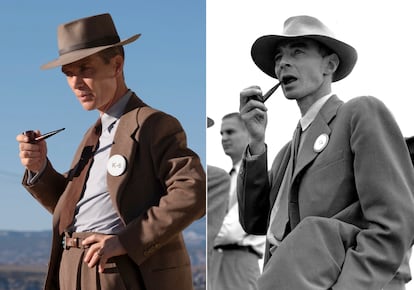The triumph of ‘Oppenheimer’ gives new life to the long romance between Hollywood and biopics
Christopher Nolan’s film about the scientist has elevated a genre — once considered synonymous with low-quality TV movies — that has become the main vehicle for winning awards


Oppenheimer’s big win at this year’s Oscars has restored some order to Hollywood. In 2023, the members of the American Film Academy chose to give the award for Best Picture to Everything Everywhere All at Once, a martial arts film about parallel universes with a strong message about the importance of family. And in 2022 and 2019, the top prize went to CODA and Green Book, respectively — considered by critics as two of the weakest Best Picture winners in recent years. The seven Oscars won by Oppenheimer — Christopher Nolan’s portrait of the father of the atomic bomb — has given new life to the industry’s romance with biopics, a genre that has been a part of cinema since its beginnings. While it has not always been respected, today the genre is enjoying renewed interest.
A biopic about Bob Marley was also released in 2024, and two other major productions are underway and set to cause a stir. Timothée Chalamet has begun filming A Complete Unknown, James Mangold’s long-awaited film about Bob Dylan’s early years. The actor is expected to sing versions of the folk idol, and the film will also include the real-life characters Woody Guthrie, Joan Baez and Pete Seeger, who will be played by Edward Norton.
Meanwhile, the 27-year-old singer and dancer Jaafar Jackson will step into the shoes of his uncle, the controversial Michael Jackson. The blockbuster — which will be released in April 2025 — has the same producers as Bohemian Rhapsody, the biopic about Freddie Mercury. The move is directed by Antoine Fuqua (Training Day) and the script is by John Logan, three-time Oscar nominee, who got a nod for The Aviator, the film based on the life of magnate Howard Hughes. With a year still to go before it hits the cinemas, the biopic has already been criticized for trying to whitewash the image of Jackson, who faced serious accusations of child sexual abuse, which were aired in the documentary Leaving Neverland.

The truth is that the power and influence of biographical films is widely documented in the United States. The biopic was one of the favorite genres of producers in the golden age of Hollywood. The academic George Custer, author of Bio/Pics How Hollywood Constructed Public History (1992), claims that the eight major studios made 291 biographical films between 1927 and 1960. Of which, 89 — 30% — focused on female figures. “In the early years, films focused on production idols, people who had done something for society. Kings, statesmen, soldiers, scientists and inventors. The establishment of these characters was a tonic for audiences during the Great Depression and World War II. Then movies began to celebrate actors and artists, athletes, people who are themselves a product,” says Professor Dennis Bingham, the director of Film Studies at Purdue University (Indiana).
Historians and critics have also described how Richard Nixon — a president who always attacked the intellectual power of the media — watched Patton in the White House several times. George C. Scott won the Oscar for playing the legendary general in Franklin Schaffner’s war classic in 1970, although he refused to accept the award, arguing the ceremony was a “meat parade.” Since then, biographical films have become the best vehicle for actors to receive awards in Hollywood.
A gift for actors
Since the 1980s, 47 actors and actresses have won an Oscar for playing a person who existed in real life. This equates to just over one Oscar per year. In 2022, for example, the two acting awards went to biopics: Will Smith, for playing the father of the tennis player sisters Venus and Serena Williams, and Jessica Chastain, for her role as the televangelist Tammy Faye. Between 1936 and 1979, 22 actors were awarded for portraying celebrities. Between 1927 and 1935, there were only two: George Arliss for playing Benjamin Disraeli and Charles Laughton, who took on the role of Henry VIII.

But the biopic has not always been the darling of the Oscars. Between 1944 and 1960, only four films of this genre were nominated for Best Picture — and none of them won. The drought worsened in the 1970s, when the genre became synonymous with low-quality TV movies. The trend started to change in 1980, when Coal Miner’s Daughter, the biopic about singer Loretta Lynn, Raging Bull (boxer Jake LaMotta) and The Elephant Man (Joseph Merrick) were released.
Now, the biopic formula has worked for Christopher Nolan, one of the most original voices in commercial Hollywood cinema and a five-time Oscar nominee for directing and writing, who had never won the statuette until making the movie about the life of J. Robert Oppenheimer. “Oppenheimer is the film that the Academy would like to award every year. A film by a prestigious, well-known director, preferably someone who has long deserved the award, like Nolan, about a real person but with a topic of deep public interest. With a lot of drama, but also an epic approach that will span many years. With good performances and a very well written script. In many ways, it is the perfect movie,” says Bingham.
Bingham compares Nolan’s triumph to when Steven Spielberg won in 1994 his first Oscar for Best Director for Schindler’s List, which also won Best Picture. Recognition had been slow in coming — the director of The Color Purple had been nominated five times since 1977 before he won the award. According to Nolan, the idea for Oppenheimer came after his producer, Charles Roven, gave him a biography on the scientist by Kai Bird and Martin J. Sherwin. The work is a monumental investigation that turned 50,000 pages of interviews, declassified documents, transcripts, correspondence and diary entries, all collected over 25 years, into a Pulitzer Prize-winning book. This biography served as the source material for an adaptation that Universal turned into a blockbuster movie, grossing $950 million.
A genre at war with the truth?
The truth has always been a complex issue for biopics. The legendary Darryl F. Zanuck of 20th Century Fox always believed that the creative needs and demands of producers came before sticking to the facts. “In Rothschild, I made Rothschild an English Baron and there never was a Rothschild Baron. I had the King of England give him the honor, and at this time, there was no King of England as the king was in the insane asylum [...] The picture in England got the same wonderful reviews in received in America and no one ever mentioned these technical discrepancies,” Zanuck wrote.
On other occasions, research material has been the strong point. When MGM studio premiered its biopic of Marie Antoinette in 1938, the audience received a pamphlet that claimed that the film’s researchers had answered nearly 60,000 questions about the monarch. In four years, they had compiled 1,500 volumes on Antoinette and some 10,600 images of the queen. One of the anecdotes told at that time, according to George Custen, was that the director, W. S. Van Dyke, refused to film a sequence because one extra, among the group of 250, was wearing the wrong pants for the time.
“Truth has always been a slippery term,” Bingham says by phone. He uses as an example the films about Queen Elizabeth I and Mary Stuart, Queen of Scots, who was imprisoned by her cousin for 19 years and later executed. These movies almost include a scene with the two of them together, when they never met in real life. “A biopic can take some license as long as it conveys the truth of the biographical subject. And I think Oppenheimer conveys it. Maybe it’s not the truth because no one can know what that is, but it doesn’t feel false, but rather thorough and exhaustive,” says Bingham. The Academy and audiences around the world would seem to agree.
Sign up for our weekly newsletter to get more English-language news coverage from EL PAÍS USA Edition
Tu suscripción se está usando en otro dispositivo
¿Quieres añadir otro usuario a tu suscripción?
Si continúas leyendo en este dispositivo, no se podrá leer en el otro.
FlechaTu suscripción se está usando en otro dispositivo y solo puedes acceder a EL PAÍS desde un dispositivo a la vez.
Si quieres compartir tu cuenta, cambia tu suscripción a la modalidad Premium, así podrás añadir otro usuario. Cada uno accederá con su propia cuenta de email, lo que os permitirá personalizar vuestra experiencia en EL PAÍS.
¿Tienes una suscripción de empresa? Accede aquí para contratar más cuentas.
En el caso de no saber quién está usando tu cuenta, te recomendamos cambiar tu contraseña aquí.
Si decides continuar compartiendo tu cuenta, este mensaje se mostrará en tu dispositivo y en el de la otra persona que está usando tu cuenta de forma indefinida, afectando a tu experiencia de lectura. Puedes consultar aquí los términos y condiciones de la suscripción digital.








































